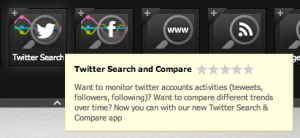In the first part of this series we looked at bringing general news sources and blogs into one place. In this part we look to another important source: social media discussions.
Social media discussions contain three types of information: news updates you haven’t seen elsewhere; expertise (analysis and insights, for example); and personal experience (case studies).
Here’s how to add them to your Netvibes dashboard:
Context, analysis and case studies: social media discussion
If you haven’t read Part 1, go here and read it now – it contains instructions on how to get started with Netvibes you’ll need to follow first.
Done? OK. That post mentioned the Netvibes ‘Essentials’ menu a couple of times – another option there is the Twitter search.
This is useful for bringing social media discussions into your netvibes feeds.
The key thing here is to keep the search specific by using quotation marks – or by using hashtags.
You might be able to guess some hashtags – #bedroomtax, for example, is a good one – while others come only when you start following particular people on Twitter (more on this in a future post).
Phrases only some people would say
Other buttons allow searches on other social media, or on forums. Forums can be particularly interesting if you want to find people affected by certain issues.
In those cases, try searching for phrases that only those people would say, rather than someone talking about the broader issue. For example, someone affected by the benefit cap might use the phrase “my benefit” or “my JSA” (Jobseekers Allowance), but people talking more generally about benefits would not.
The video and image searches in Netvibes are also worth trying, as some people will upload media about their experiences rather than write lengthy text updates. Again, you can expect a more hit-and-miss effect here, with US results complicating things.
In some cases you can have more success by instead using a search for your local area.
All of these are worth trying and tweaking – but if you get too many irrelevant results consider deleting it.
For more ideas on finding experts and affected communities see the 6th part of Help Me Investigate’s guide 7 ways to follow a field you want to investigate.
In the final part we look at facts and documents: how to know what government departments are saying and doing, even if no one is reporting it.
